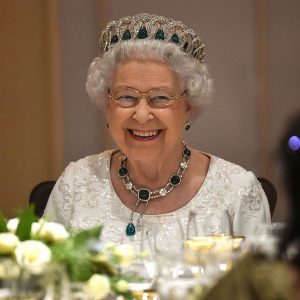One hundred years of famous royal portrait photography is being celebrated in a new exhibition at Buckingham Palace.
An unseen family photo marking the birth of four royal babies and the earliest surviving colour photographic print of a member of the royal family are among the historic highlights.
Notable royal pictures on display include works by Dorothy Wilding, Cecil Beaton, Annie Leibovitz, David Bailey, Andy Warhol and Rankin.
Also on show is fashion photographer Paolo Roversi’s portrait of the Princess of Wales, taken to mark her milestone 40th birthday.
A coronation portrait by Hugo Burnand of the King (Yui Mok/PA)
Kate’s off the shoulder dress and sideways pose are described by the Royal Collection Trust as bearing a “striking visual resemblance” to an 1864 painting of Alexandra, Princess of Wales – later Queen Alexandra – by Franz Xaver Winterhalter.
Visitors to Royal Portraits: A Century of Photography at the King’s Gallery, which opens on Friday, will be able to compare the two images, with the historic 19th century depiction of Alexandra hanging near the black and white image of Kate.
Royal Portraits: A Century of Photography exhibition
The portrait by Paolo Roversi near the painting of Alexandra, Princess of Wales in 1864 (Yui Mok/PA)
Kate, a keen photographer who sparked a furore with the editing of the Waleses’ Mother’s Day picture, has stepped away from the public spotlight while she undergoes chemotherapy for cancer.
The exhibition includes a section on the history of retouching, including a letter from the photographer Earl of Snowdon discussing editing a photo of Prince Philip, the late Duke of Edinburgh.
The display explains the “stages of a typical royal portrait commission,” listing retouching as number four of six, the Daily Telegraph reported.
Exhibition curator Alessandro Nasini told the newspaper that retouching has been around since photography was invented and was an important part of royal portraiture.
“Retouching is very much part of it as one of the tools that the photographer has to use as a way of translating the vision they had in their mind,” he said.
Warhol’s 1985 portrait of Queen Elizabeth II was sprinkled with diamond dust to make it sparkle in the light, while Rankin’s 2001 photograph of the smiling Queen was superimposed against the union flag and Polly Borland’s Golden Jubilee portrait of the Queen was set on a glittering gold backdrop.
They are the among the examples of experimentation and playfulness from the 1980s onwards.
Portraits by Polly Borland (left) and Rankin (right) (Yui Mok/PA)
The exhibition also sheds light on behind-the-scenes processes, from contact sheets and photographers’ handwritten annotations to correspondence with members of the royal family and their staff.
The earliest surviving photographic print of a member of the royal family produced in colour shows Princess Alice, Duchess of Gloucester – sister-in-law to King George VI – on her wedding day.
It was taken in 1935 by Madame Yevonde, a pioneer of colour photography and champion of women photographers.
Alongside portraits marking official occasions are more intimate family moments, including a never-before-seen image of four royal mothers – Queen Elizabeth II, Princess Margaret, Princess Alexandra and the Duchess of Kent – holding their newborn babies.
A portrait by Lord Snowdon of Princess Margaret, 1967 (Yui Mok/PA)
The babies are Prince Edward (now the Duke of Edinburgh), Lady Sarah Armstrong-Jones (now Lady Sarah Chatto), James Ogilvy and Lady Helen Windsor (now Lady Helen Taylor) – who all turned 60 this year.
The image was taken by Margaret’s husband, Lord Snowdon, as a personal token of thanks for Sir John Peel, the royal obstetrician who delivered all four babies within the space of two months.
On display is a handwritten letter from Margaret to her sister the late Queen, asking her “Darling Lilibet” to sign the print “as a souvenir of an extraordinary two months of delivery” and also suggesting they take a trip to the theatre to see Noel Coward’s “witty” comic play Hay Fever.
The Snowdon portrait of the four royal mothers and Princess Margaret’s letter to her sister (Royal Collection Trust/PA)
“If you enjoyed ‘Private Lives’ this is just the ticket. Would like to see it? It would be such fun to see if together,” Margaret writes.
Nasini said: “The Royal Collection holds some of the most enduring photographs ever taken of the royal family, captured by the most celebrated portrait photographers of the past hundred years – from Dorothy Wilding and Cecil Beaton to Annie Leibovitz, David Bailey, and Rankin.
“Alongside these beautiful vintage prints, which cannot be on permanent display for conservation reasons, we are excited to share archival correspondence and never-before-seen proofs that will give visitors a behind-the-scenes insight into the process of creating such unforgettable royal portraits.”
A 2013 portrait by Nadav Kander of the King at the Prince of Wales on show at the King’s Gallery (Yui Mok/PA)
Royal Portraits: A Century of Photography is at The King’s Gallery, Buckingham Palace, from May 17 to October 6.










